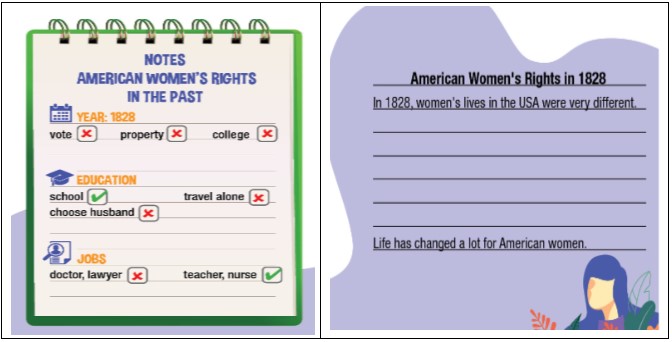Lesson 1 - Unit 5. Gender Equality - SBT Tiếng Anh 10 iLearn Smart WorldNew Words a. Look at this code and write the correct word.b. Fill in the blanks using the words in Task a.Listening a. Listen to Eleanor talking about her great-grandmother’s life.b. Now, listen and circle the correct answers. An example has been done for you.Grammar a. Fill in the blanks with the correct form of the verbs in the brackets. Practice saying the sentences.b. Rewrite the sentences using to-infinitive or bare infinitive.Writing Look at the information and write a paragraph about wom Quảng cáo
Lựa chọn câu để xem lời giải nhanh hơn
New Words a a. Look at this code and write the correct word. (Nhìn vào mã này và viết từ chính xác.)
Lời giải chi tiết: 1. vote: bình chọn, biểu quyết 2. property: tài sản 3. election: bầu cử 4. rights: quyền 5. allow: cho phép New Words b b. Fill in the blanks using the words in Task a. (Điền vào chỗ trống bằng các từ trong Task a.) 1. Two hundred years ago, women were not able to own _______ like houses or apartments. 2. My grandfather didn’t ________ my mother to study overseas.She had to study near her home. 3. Margaret Thatcher won the UK general ____________ and became Prime Minister in 1979. 4. Women have tried to get equal _________ with men for many years. 5. Women were not able to ___________ for new governments unless they were married and over 25. Lời giải chi tiết: 1. Two hundred years ago, women were not able to own property like houses or apartments. (Hai trăm năm trước, phụ nữ không thể sở hữu tài sản như nhà ở hoặc căn hộ.) 2. My grandfather didn’t allow my mother to study overseas.She had to study near her home. (Ông tôi không cho phép mẹ tôi đi du học, bà phải học gần nhà.) 3. Margaret Thatcher won the UK general election and became Prime Minister in 1979. (Margaret Thatcher chiến thắng trong cuộc tổng tuyển cử ở Vương quốc Anh và trở thành Thủ tướng năm 1979.) 4. Women have tried to get equal rights with men for many years. (Phụ nữ đã cố gắng để có được quyền bình đẳng với nam giới trong nhiều năm.) 5. Women were not able to vote for new governments unless they were married and over 25. (Phụ nữ không thể bỏ phiếu cho chính phủ mới trừ khi họ đã kết hôn và trên 25 tuổi.) Listening a a. Listen to Eleanor talking about her great-grandmother’s life. (Nghe Eleanor kể về cuộc sống của bà cố của cô ấy.) Eleanor’s great-grandmother was more able to do what she wants … (Bà cố của Eleanor có nhiều khả năng làm những gì bà ấy muốn…) 1. when she was a child. (khi cô ấy còn là một đứa trẻ.) 2. after she was 25 years old. (sau khi cô ấy 25 tuổi.) Phương pháp giải: Bài nghe: My name is Eleanor and I want to tell you about my great grandmother. Things are very different for women when she was young. She had to leave school when she was sixteen, she wanted to be a lawyer but her father wouldn't let her go to Chicago to study. He was a doctor and wanted her to be a nurse. There were lots of things women couldn't do in those days. Even though they can work, they didn't earn the same money as men and they weren't able to own property. At age 20, she met a man she wanted to marry but her parents wouldn't let her. She was very sad. Years later, she met my great grandfather on her twenty fifth birthday. This time she didn't listen to our parents, they were married six months later. They had three children. My great grandmother started working for the local government when she was thirty five. She helped women earn the same money as men for the same job. When she was nearly fifty, she was elected mayor of the city. The whole family watched as she gave a speech on national TV. She was an amazing woman that did many things to help women. Tạm dịch: Tên tôi là Eleanor và tôi muốn kể cho bạn nghe về người bà tuyệt vời của tôi. Mọi thứ rất khác đối với phụ nữ khi cô ấy còn trẻ. Cô phải rời trường khi cô mười sáu tuổi, cô muốn trở thành một luật sư nhưng cha cô không cho cô đến Chicago để học. Anh là bác sĩ và muốn cô trở thành y tá. Có rất nhiều điều mà phụ nữ không thể làm trong những ngày đó. Mặc dù họ có thể làm việc, nhưng họ không kiếm được tiền như nam giới và họ không thể sở hữu tài sản. Ở tuổi 20, cô gặp một người đàn ông mà cô muốn kết hôn nhưng bố mẹ cô không cho phép. Cô ấy đã rất buồn. Nhiều năm sau, cô ấy gặp ông cố của tôi vào ngày sinh nhật thứ hai mươi lăm của cô ấy. Lần này cô ấy không nghe lời bố mẹ chúng tôi, sáu tháng sau họ cưới. Họ đã có ba người con. Bà cố của tôi bắt đầu làm việc cho chính quyền địa phương khi bà ba mươi lăm tuổi. Cô ấy đã giúp phụ nữ kiếm được tiền tương đương với nam giới cho cùng một công việc. Khi gần năm mươi tuổi, bà được bầu làm thị trưởng thành phố. Cả nhà cùng theo dõi khi cô ấy có bài phát biểu trên kênh truyền hình quốc gia. Cô ấy là một người phụ nữ tuyệt vời đã làm nhiều điều để giúp đỡ phụ nữ. Lời giải chi tiết: Eleanor’s great-grandmother was more able to do what she wants: 2. after she was 25 years old. (Bà cố của Eleanor đã có nhiều khả năng hơn để làm những gì bà ấy muốn: 2. sau khi bà 25 tuổi.) Listening b b. Now, listen and circle the correct answers. An example has been done for you. (Bây giờ, hãy lắng nghe và khoanh tròn các câu trả lời đúng. Một ví dụ đã được làm cho bạn.)  Lời giải chi tiết:
1. What job did Eleanor’s great-grandmother want to do? b. lawyer (Bà cố của Eleanor muốn làm công việc gì? b. luật sư) 2. Which of these things could she do? b. get a job (Cô ấy có thể làm gì trong số những điều này? b. có một công việc) 3. How old was she when she got married? b. 25 (Cô ấy bao nhiêu tuổi khi kết hôn? b. 25) 4. What did she help women have when she worked for local government? a. equal pay (Bà đã giúp gì cho phụ nữ khi bà làm việc cho chính quyền địa phương? a. trả lương ngang nhau) 5. What did she do on national TV? c. gave a speech (Cô ấy đã làm gì trên truyền hình quốc gia? c. đã đưa ra một phát biểu) Grammar a a. Fill in the blanks with the correct form of the verbs in the brackets. Practice saying the sentences. (Điền vào chỗ trống với dạng đúng của động từ trong ngoặc. Luyện nói các câu.) 1. In the past, women weren’t __________ to college. (allow/go) 2. My great-grandmother was not able ___________ as a lawyer. (work) 3. The government _______________ (not let) women vote. 4. In the 1800s, women had ___________ (marry) the man their father chose. 5. Many women ___________ (cannot work) in the job they wanted. 6. We ___________ (see) the first woman win the election in 1979. Lời giải chi tiết: 1. In the past, women weren’t allowed to go to college. (Trước đây, phụ nữ không được phép đi học đại học.) 2. My great-grandmother was not able to work as a lawyer. (Bà cố của tôi không thể làm luật sư.) 3. The government didn’t let women vote. (Chính phủ không để phụ nữ bỏ phiếu.) 4. In the 1800s, women had to marry the man their father chose. (Vào những năm 1800, phụ nữ phải kết hôn với người đàn ông mà cha họ đã chọn.) 5. Many women couldn’t work in the job they wanted. ( Nhiều phụ nữ không thể làm công việc họ muốn.) 6. We saw the first woman win the election in 1979. (Chúng tôi đã chứng kiến người phụ nữ đầu tiên thắng cử vào năm 1979.) Grammar b b. Rewrite the sentences using to-infinitive or bare infinitive. (Viết lại các câu bằng cách sử dụng động từ nguyên mẫu có “to” hoặc động từ nguyên mẫu.) 1. 1800s/women/not/able/do/many things ____________________________________________________________ 2. Parents/not/let/daughters/choose/own husband ____________________________________________________________ 3. They/decided/who/daughters/could/marry ____________________________________________________________ 4. Women/not/allowed/go/college ____________________________________________________________ 5. They/had/stay home/take care/of/younger children ____________________________________________________________ Lời giải chi tiết: 1. In the 1800s, women were not able to do many things. (Vào những năm 1800, phụ nữ không có khả năng làm nhiều việc.) 2. Parents didn’t let their daughters choose their own husband. (Cha mẹ không để con gái của họ tự chọn chồng.) 3. They decided who their daughters could marry. (Họ quyết định con gái của họ có thể kết hôn với ai.) 4. Women were not allowed to go to college. (Phụ nữ không được phép đi học đại học.) 5. They had to stay home and take care of the younger children. (Họ phải ở nhà và chăm sóc những đứa trẻ.) Writing Look at the information and write a paragraph about women’s lives in the past. Use the words in the box and look at other parts of the lesson for ideas. (Xem thông tin và viết một đoạn văn về cuộc sống của phụ nữ trong quá khứ. Sử dụng các từ trong khung và xem các phần khác của bài học để tìm ý tưởng.)
American Women’s Rights in 1828 In 1828, women’s lives in the USA were very different. Women were not able to vote, and there were many jobs they couldn’t do. Women couldn’t choose their husband. They had to marry the man their parents chose. American women were not allowed to go to college, too. They had to stay home and take care of the younger children. Women didn’t have equal pay with men. Life has changed a lot for American women. Tạm dịch: Quyền của phụ nữ Mỹ năm 1828 Vào năm 1828, cuộc sống của phụ nữ ở Hoa Kỳ rất khác. Phụ nữ không thể bỏ phiếu và có nhiều công việc mà họ không thể làm. Phụ nữ không thể chọn chồng cho họ. Họ phải kết hôn với người đàn ông mà cha mẹ họ đã chọn. Phụ nữ Mỹ cũng không được phép đi học đại học. Họ phải ở nhà và chăm sóc các em nhỏ. Phụ nữ không được trả lương ngang bằng với nam giới. Cuộc sống của phụ nữ Mỹ đã thay đổi rất nhiều.
|























Danh sách bình luận